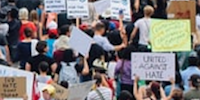September 2003
Damage to relationships is almost inevitable in intractable conflicts. Relationships that had been friendly, open, and trusting no longer are so. Walls go up, as people move farther and farther apart. The "norm" becomes distrust, fear, anger, and hostility, where friendship and trust prevailed before.
Example: The Failing Marriage
Strained marriages are an example. Newlyweds, generally, are in love. They become increasingly intimate and "in tune" with each other, sharing thoughts and feelings, interests and jokes. When they take their vows, they promise to love and live together forever... "until death do us part." Although there are exceptions, newlyweds usually trust each other, and try hard to accommodate the others' wishes (although living together for the first time can be the first, surprising source of strain).
As time goes by, some relationships get stronger and stronger, while others start to deteriorate. Sometimes this deterioration is caused by a specific event: physical abuse or an affair, loss of a job or death of a parent. Or, the deterioration may grow slowly over time. The couple may develop different interests, or they may start to have disputes over "little things" that are handled badly and begin to drive them apart.
Although all couples have little problems, those in successful marriages learn how to negotiate solutions early on. If they do not, tension can build up in the relationship that becomes harder and harder to deal with. Positive interaction is increasingly replaced by negative interaction: criticism, putdowns, power struggles, and abuse. This mode of interaction becomes seen as "normal," while the earlier positive interactions become rare. Although therapy can sometimes help rebuild a failing relationship, the longer the destructive dynamics have gone on, the more damage has usually been done, and the harder the relationship is to repair.
Other Relationships
|
Ron Fisher, of American University, talks about the need to rebuild relationships in Cyprus to bring about reconciliation. |
The same is true in many other kinds of relationships, from interpersonal to international. People on opposite sides of a long-running conflict tend to avoid each other, or be watchful when the other is around. Information is no longer shared; that which is shared is no longer trusted. The longer the conflict has lasted, the more the hostility and distrust becomes identified as the "normal" relationship, and the harder it is to re-establish the openness and trust that existed before the conflict started.
This is not critical in some conflicts, where the relationship was only supposed to be short-term anyway. Thus, if one is involved in a business relationship that breaks down, one can stop doing business with the adversary, and while you may have had considerable aggravation and lost some money, the end of the relationship is not itself a major cost.
In other cases, however, the end of the relationship is a huge cost. This is often true in family conflicts, particularly if there are children involved. The same is true with groups of people who have to work or live together, whether they want to or not. Serbs, Muslims, and Croats all had to share the Balkans -- none of them could, or wanted, to leave. The Israeli Jews and the Palestinians have to learn to live together eventually -- part of what is so frustrating about that conflict is that most people know that. But the relationships have been so damaged, the hostility and distrust is so deep, that repairing it to the point that peace can be achieved is a very difficult struggle.
|
Ron Fisher, of American University, briefly describes an information process in South Africa that helped restore trust between factions, paving the way toward a peace agreement. |
Those ethnic conflicts illustrate one of the most difficult aspects of lost relationships: parties to intense intractable conflicts often demonize the other -- developing "enemy images," or even dehumanizing the other side, thereby justifying previously unthinkable abuse, such as rape, torture, or genocide. Once such extreme atrocities are committed, re-establishing "normal" relationships is very difficult and slow.
Also, if extremely hostile relationships persist they get integrated into the culture of the societies. History gets written, and passed down through families, painting one's own side as virtuous, and the other side as evil. If these messages are heard over and over again from trusted sources -- one's parents, one's teachers, one's friends -- it gets very hard to question or oppose such beliefs, and people who do are often ostracized, persecuted, or even killed. So damaged relationships are somewhat like a one-way street with no street going the other way. It is surprisingly easy to go down that street -- but it is often very hard to get back.
Use the following to cite this article:
Burgess, Heidi. "Damaged or Destroyed Relationships." Beyond Intractability. Eds. Guy Burgess and Heidi Burgess. Conflict Information Consortium, University of Colorado, Boulder. Posted: September 2003 <http://www.beyondintractability.org/essay/damaged-relationships>.











